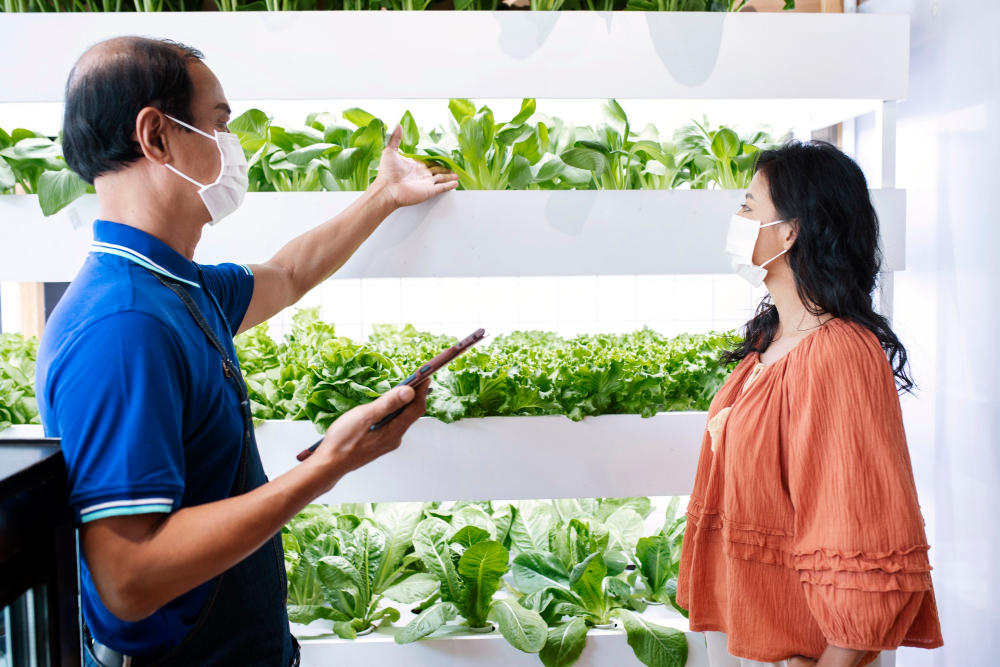At Ponic Greens, we specialize in soil-less hydroponic systems that use water enriched with essential
nutrients to grow vegetables, herbs, and small fruits year-round—regardless of season or climate. Ideal
for both commercial farms and urban growers, our systems boost yield, conserve space, and give you
total control over how your plants grow.
How to Grow Hydroponic Plants—Step by Step
1. Choose Your System
Options include Deep Water Culture, Nutrient Film Technique (NFT), drip systems, and wicking. Pick
the method that fits your available space and goals.
2. Prepare the Nutrient Solution
Mix the right hydroponic nutrient blend with water according to the system and growth stage of your
plants.
3. Plant Seeds or Seedlings
Place them in your growing medium so the roots make good contact with the nutrient solution or
medium.
4. Maintain pH Levels
Aim for a pH of 5.5–6.5. Use a pH meter and adjust as needed to keep plants healthy and nutrient
uptake optimal.
5. Control Grow Conditions
Monitor temperature, humidity, pH, and nutrient concentration, and adjust as necessary.
6. Provide Adequate Lighting
Indoors, use budget-friendly fluorescent or LED grow lights. Aim for 8+ hours/day depending on plant
type.
7. Renew the Nutrient Solution
Refill or replace your nutrient water regularly to avoid imbalance or contamination.
8. Watch Plant Health
Inspect leaves and stems for signs of disease or deficiencies. Act quickly if issues arise.
9. Harvest
When plants reach maturity, collect them carefully—avoiding root or stem damage.
How Hydroponic Watering Works
Hydroponic plants thrive in nutrient-rich water, not soil. To water them effectively:
- Check water levels often, ensuring roots remain submerged.
- Maintain pH between 5.5 and 6.5 for optimal nutrient absorption.
- Top-up nutrients, creating a balanced solution tailored to your plants’ needs.
Best Nutrients to Use
- Macronutrients (NPK): Essential for plant growth—Nitrogen promotes foliage, Phosphorus supports roots and flowers, Potassium aids overall health.
- Micronutrients: Include Iron, Manganese, Boron, and Zinc for full-spectrum growth.
- Organic blends: Great for eco-friendly growers; they boost microbial health too.
Top 13 Hydroponic Plants for Home & Lawn
Vegetables & Greens
- Spinach: Fast, compact, ideal in NFT systems (30–40 days to mature)
- Kale : Hardy, nutritious, matures in under 40 days
- Lettuce: Quickest-growing (under 30 days), perfect for NFT or DWC
- Tomatoes : Grow well in DWC with strong lighting; disease-resistant
- Beans: Low-maintenance, high-yield
- Peppers: Require height control and good lighting
- Cucumbers: Fast growers, thrive with warmth and light
Herbs
- Chives: Easy-care, harvest-ready in 40–60 days
- Basil: Prolific and fast-growing; needs good light
- Mint: Beginner-friendly, adaptable indoor grow
Fruits
- Strawberries: Harvestable in \~60 days; tower systems work well
- Blueberries: Need warm conditions; NFT is ideal
- Grapes: Advanced growers can succeed with consistency and care
Pro Tips for Hydroponic Success
- Use healthy seeds/seedlings from trusted sources
- Test and adjust pH frequently
- Invest in good lighting, like energy-saving LEDs
- Avoid overfeeding to prevent nutrient imbalance
- Maintain environment (temperature/humidity) in ideal ranges
- Clean your system regularly to prevent disease
- Ensure plant spacing for airflow and disease control
- Monitor often and address yellowing leaves or pests quickly
Choosing the Right Plants
Consider these factors when selecting crops:
Factor Considerations
Growth Habit Compact roots = better in hydroponics
Space & Light Needs Herbs need less space; vining crops need structure and light
Growth Time Microgreens = fast; fruits = longer cycles
Budget DIY setups can save costs; equipment = investment
FAQs
What are hydroponic plants?
Plants grown without soil, using nutrient-rich water solutions for faster and cleaner growth.
Can I use Epsom salts in hydroponics?
Yes—sparingly. They supply magnesium and sulfur, but must be balanced to avoid nutrient buildup.
Which plants are not suitable?
Avoid:
* Large trees/shrubs (need extensive root space)
* Root veggies (e.g., carrots)
* Long-lived perennials (prefer soil)
Partner with Ponic Greens—your trusted hydroponic system maker in Delhi & Gurugram—and transform your growing journey. Need help choosing the right setup or crops? We’re here to guide you!

